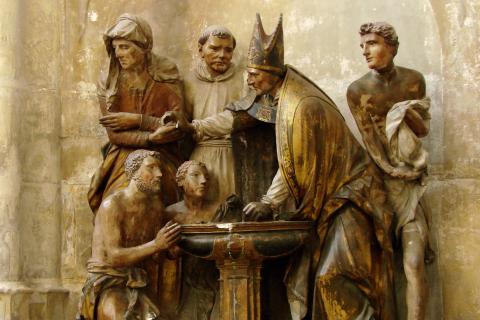
A recent First Things article, titled “The Remarkable Legacies of Ordinary Catholic Women,” took a cue from the new film Cabrini, which hit theaters in recent weeks and tells the story of Mother Frances Xavier Cabrini, the first American saint. Noting how little Catholics today know about the legacies of holy women like her, Bronwen McShea retells the stories of female saints who have been – in often hidden ways – vital to the history of the Church, whose stories we’ve forgotten unfairly, and to our detriment.
If McShea’s piece focuses on the contributions of women, though, there is as much to be said for her choice of the word “ordinary” to describe them. It’s a word God seems to be deeply invested in, too, the “ordinariness” her article tracks being an ordinariness that could be said to mark the lives of the vast majority of Christians, wholesale.
Indeed, it’s an ordinariness that seems to express something of God’s “fair dealing” with the human race. Even beyond gender differences, it’s yet more true that the vast majority of both men and women have had no possibility of becoming noteworthy in the world’s sense of the term. Only the few gain renown, and those who do most often do so either by having remarkable gifts for which they cannot take credit (intelligence, beauty, creativity) or because of their circumstances – by being born the heir to an empire, for instance; or by having thrust upon them a big stage on which to display great heroism or virtue, a stage which came to them through circumstances beyond their control. Most people don’t have any of these kinds of luck. And that seems kind of unfair.
But God purposely turns this way of estimating things on its head. The Son of God himself spent the great majority of his earthly life in the most ordinary of circumstances: he was unknown, fairly poor, not recognized for any remarkable talent. In truth he was anything but ordinary; but his was a hidden potency, powerful enough to transform the world, though camouflaged to human sight.
The same is true of all Christians. Those reborn in Christ are creatures of light and power, carrying on the Lord’s own work to transform the world in ways that are now unseen. What we seem to be is not what we fully are – the ordinary only veils the extraordinary. Or, as C.S. Lewis once put it, “It is a serious thing to live in a society of possible gods and goddesses, to remember that the dullest, most uninteresting person you can talk to may one day be a creature which, if you saw it now, you would be strongly tempted to worship, or else a horror and a corruption such as you now meet, if at all, only in a nightmare . . . There are no ordinary people. You have never talked to a mere mortal.”
All of which gives rise to a helpful, practical insight: Christians – we who find ourselves transformed anew by the glories and graces of celebrating Jesus’s resurrection – are to be content to immerse themselves in the mundane. Like many of the women McShea discusses, who prayed faithfully, embraced single-mindedly the demands of the Gospel, and attended devotedly if not glamorously to the people and communities entrusted to them, Christians need not trouble themselves over what the world thinks is noteworthy or prestigious. They need not be restive and unsettled, wandering after seemingly significant experiences or circumstances. They know that their consistent round of duties is gaining for themselves an eternal destiny, through which they will arrive at their true form.
They also know that the only way to get there is to embrace the lowly – the ordinary and the unimpressive. Heaven is sure to be full of surprises, not the least of which is likely to be discovering who the great ones among us really are. For probably they are those we’ve never heard of who have most threatened the devil’s kingdom and changed the world for good. “Many who are last will be first,” Jesus says. That’s God’s way of doing things. It’s God’s way of putting the pomp and pride of the devil to shame, and it's God’s way of extending justice and mercy, both, to the human race.
In recounting the moment he and Peter discovered Christ's tomb to be empty on Easter morning, Saint John places a strange emphasis on the burial clothes that had been left behind. Perhaps there's more reason to this than we often suspect.
"The good, true, and beautiful must be real to us, more real than the discourse around it."
John Cardinal Onaiyekan, who served as Archbishop of Abuja (the capital city of Nigeria) from 1994 to 2019, reflects upon his experience living in an interreligious atmosphere to explain why the necessity of interreligious dialogue doesn't negate our mission mandate.
Did you know that Eastern Christians and Western Christians often celebrate Easter on different days? This Easter (for Westerners), the Orthodox Patriarch of Constantinople expressed his desire for all Christians to celebrate Easter on a unified date.


